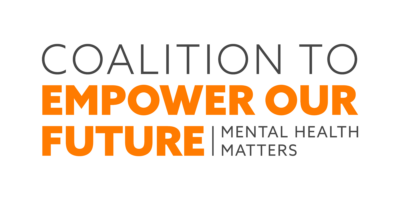Finding a Lasting Solution to the Youth Mental Health Challenge Requires a Broad Approach

By Dr. Caroline Carney, advisor to the Coalition to Empower our Future
Great efforts have been made to erase the stigma around mental health in recent years. For the most part, talking about mental health is now more mainstream than taboo – it’s something we are all trying to better understand and address. While we can be proud of the progress we’ve made, we have a way to go when it comes to meaningfully addressing youth mental health and wellbeing challenges, including a growing sense of isolation, eating disorders, cyberbullying and suicide.
It seems that young people today are living in a uniquely complicated world. Some aspects of childhood will remain universal – the desire to connect, play and explore. But shifting societal norms, a global pandemic, cultural changes and more have shaped today’s youth in ways preceding generations might not fully relate to. As a mother and physician, I’ve had a front row seat to the multitude and complexity of factors that mold young people’s experiences and mental wellbeing.
Mental health issues among adolescents have risen sharply in recent years. Anxiety, depression and even suicide take a disproportionate toll on children and teenagers. According to the Centers for Disease Control and Prevention (CDC), one in seven adolescents aged 10 to 19 experience mental health conditions. Furthermore, the CDC’s 2023 Youth Behavior Risk Survey found that a troubling 20.4 percent of high school students seriously considered attempting suicide, and 9.5 percent had attempted suicide. While we continue to make significant strides in addressing these challenges, we haven’t yet found the root of the problem. So, what is driving the youth mental health challenge?
I understand why it is tempting to single out one contributing factor – poverty, overuse of social media and devices, bullying, family dynamics, family history and so on. My experience talking to young patients tells me this is simply not the case.
Regardless of the hat I’ve worn as a clinician, an administrator or an executive, my teams were determined to help people live free from behavioral health conditions or receive the best treatment possible. Even with a multifaceted approach to creating optimal health outcomes, no single intervention – whether it’s therapy, medication, diet and exercise, social support or any other kind of medical attention – will adequately resolve health challenges for every individual. Youth mental health is no exception. We must understand the drivers of distress and illness and ensure that we holistically approach interventions.
Mental healthcare isn’t just about addressing the immediate challenge with a narrow point of view of attribution or treatment. It’s a long-term process that must be addressed with a wide lens aimed at understanding the drivers of mental health and substance abuse, prevention and multi-focal interventions that are aligned with the level of need.
Cultural shifts and the pandemic have changed societal attitudes toward mental health – a feat that deserves celebration. Now, the next step is convening a cross-section of collaborators to work toward finding long-term solutions. The Coalition to Empower our Future is seeking to do just that, building upon the incredible work already being done across the country by organizations large and small to make sure we’re having a comprehensive conversation aimed at better understanding the many complex factors contributing to the state of youth mental health and wellbeing. Educators, parents, families, mental health professionals, healthcare providers and experts in the public and private sectors all bring unique experiences and tools to the table that can help create an all-encompassing solution that fosters a supportive environment for young people.
The Coalition to Empower our Future is determined to shine a light on meaningful solutions so that mental health is an indispensable component of overall health and wellbeing. As its first advisor, I look forward to continuing my advocacy on behalf of young people and supporting the pursuit of sustainable, lasting solutions to the youth mental health and wellbeing challenge.
Dr. Caroline Carney is the president and chief medical officer of Magellan Health. She speaks and writes about issues related to youth mental health, drawing on her ongoing clinical work and her experience mothering in a digital age. She can be found at: https://www.linkedin.com/in/drccarney/
###

